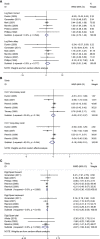Menopausal hormone therapy does not improve some domains of memory: A systematic review and meta-analysis
- PMID: 36147572
- PMCID: PMC9486389
- DOI: 10.3389/fendo.2022.894883
Menopausal hormone therapy does not improve some domains of memory: A systematic review and meta-analysis
Abstract
Background: Aged women appear to be at a higher risk of developing memory impairment than men. Whether menopausal hormone therapy (MHT) could improve memory in postmenopausal women remains unclear. We thus conducted a meta-analysis to investigate the potential effect of MHT on memory, especially verbal memory, in postmenopausal women.
Methods: PubMed, Cochrane, Embase, Chinese Biomedical Literature Database, and web of ClinicalTrials.gov were systematically searched for randomized controlled trials comparing MHT versus placebo in postmenopausal women. Our primary outcome of interest is memory function.
Results: We included 10 studies with 2,818 participants in the final analysis. There was no significant differences in immediate recall (weighted mean difference [WMD] 0.34, 95% confidence interval [CI]: -0.73, 1.40), delayed recall (WMD 0.99, 95% CI: -0.51, 2.48), short-delay (WMD -0.00, 95% CI: -0.37, 0.37), and long-delay (WMD -0.19, 95% CI: -0.69, 0.31) recall between WMT and placebo. WMT was associated with a lower digit span forward (mean reduction -0.20, 95% CI: -0.36, -0.03). In women within 5 years of menopause, MHT did not differ in immediate (0.45, 95% CI: -0.75, 1.65) or delayed recall (1.03, 95% CI: -0.93, 3.00), and digit span forward (-0.11, 95% CI: -0.72, 0.50), when compared with placebo.
Conclusion: This meta-analysis suggested that MHT had no effect on verbal memory in postmenopausal women, and may impair some domains of short-term memory. Current available evidence does not support MHT for improving memory in women less than 60 years, even in recently menopausal women.
Systematic review registration: https://www.crd.york.ac.uk/PROSPERO, identifier CRD42021233255.
Keywords: cognition; memory; menopausal hormone therapy; menopause; meta-analysis; systematic review; women.
Copyright © 2022 Chen, Zheng, Chen, Liu, Yao and Chen.
Conflict of interest statement
The authors declare that the research was conducted in the absence of any commercial or financial relationships that could be construed as a potential conflict of interest.
Figures





Similar articles
-
Systematic review and meta-analysis of the effects of menopause hormone therapy on cognition.Front Endocrinol (Lausanne). 2024 Mar 4;15:1350318. doi: 10.3389/fendo.2024.1350318. eCollection 2024. Front Endocrinol (Lausanne). 2024. PMID: 38501109 Free PMC article.
-
The Effects of Menopause Hormone Therapy on Lipid Profile in Postmenopausal Women: A Systematic Review and Meta-Analysis.Front Pharmacol. 2022 Apr 12;13:850815. doi: 10.3389/fphar.2022.850815. eCollection 2022. Front Pharmacol. 2022. PMID: 35496275 Free PMC article.
-
The benefits and risks of menopause hormone therapy for the cardiovascular system in postmenopausal women: a systematic review and meta-analysis.BMC Womens Health. 2024 Jan 23;24(1):60. doi: 10.1186/s12905-023-02788-0. BMC Womens Health. 2024. PMID: 38263123 Free PMC article.
-
Associations Between Midlife Menopausal Hormone Therapy Use, Incident Diabetes, and Late Life Memory in the Wisconsin Longitudinal Study.J Alzheimers Dis. 2023;93(2):727-741. doi: 10.3233/JAD-221240. J Alzheimers Dis. 2023. PMID: 37092221 Free PMC article.
-
Cognitive health after menopause: Does menopausal hormone therapy affect it?Best Pract Res Clin Endocrinol Metab. 2021 Dec;35(6):101565. doi: 10.1016/j.beem.2021.101565. Epub 2021 Aug 17. Best Pract Res Clin Endocrinol Metab. 2021. PMID: 34538724 Review.
Cited by
-
The novel estrogen receptor beta agonist EGX358 and APOE genotype influence memory, vasomotor, and anxiety outcomes in an Alzheimer's mouse model.Front Aging Neurosci. 2024 Nov 13;16:1477045. doi: 10.3389/fnagi.2024.1477045. eCollection 2024. Front Aging Neurosci. 2024. PMID: 39629477 Free PMC article.
-
The 100 top-cited articles in menopausal syndrome: a bibliometric analysis.Reprod Health. 2024 Apr 8;21(1):47. doi: 10.1186/s12978-024-01770-9. Reprod Health. 2024. PMID: 38589898 Free PMC article.
-
Systematic review and meta-analysis of the effects of menopause hormone therapy on cognition.Front Endocrinol (Lausanne). 2024 Mar 4;15:1350318. doi: 10.3389/fendo.2024.1350318. eCollection 2024. Front Endocrinol (Lausanne). 2024. PMID: 38501109 Free PMC article.
-
Hypogonadism and neurocognitive outcomes among childhood cancer survivors.Eur J Endocrinol. 2024 Mar 2;190(3):220-233. doi: 10.1093/ejendo/lvae027. Eur J Endocrinol. 2024. PMID: 38468563 Free PMC article.
-
Cognitive Problems in Perimenopause: A Review of Recent Evidence.Curr Psychiatry Rep. 2023 Oct;25(10):501-511. doi: 10.1007/s11920-023-01447-3. Epub 2023 Sep 27. Curr Psychiatry Rep. 2023. PMID: 37755656 Free PMC article. Review.
References
-
- Fratiglioni L, Launer LJ, Andersen K, Breteler MM, Copeland JR, Dartigues JF, et al. . Incidence of dementia and major subtypes in Europe: A collaborative study of population-based cohorts. Neurologic diseases in the elderly research group. Neurology (2000) 54(11 Suppl 5):S10–5. - PubMed
Publication types
MeSH terms
LinkOut - more resources
Full Text Sources
Medical

